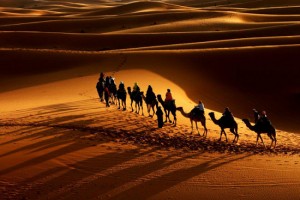 The Cross and Lotus
The Cross and Lotus
A History of Christianity in a Buddhist Context
By James Carlton Stephens
Tempers ran high along the Silk Road for generations between merchants, mercenaries and monks, who spent weeks trekking alongside camels through the desert sands at night avoiding marauders and the blistering mid day sun. Refreshing stops at a desert Oasis for several days to a week at a time provided ample opportunity for a religious debate for these road scholars who traded social gossip as readily as silk and gold.
At times the raging wind blew the swirling sand across the great dunes until the normal trail was no longer visible. Hamid, the experienced Bedouin trader sensing the futility of further travel erected his two room gutba effortlessly in what seemed but a moment. It was an inbred ritual of survival that generations’ had carried out. Once the tent was secured, he placed an interior light on the tent’s center pole signifying his tribe’s belief that ‘Allah is the light of the heavens and earth’ (Surah 24, Ayah 35). Kneeling towards Mecca he intently rolled out the niche carpet in the alcove of the gutba designed for Muslim prayers, bowed and thanked Allah for refuge from the storm. The incessant pelting sand bred a drowsy rest among the remaining exhausted pilgrims.
As early evening approached, the winds died down and the camp arose to a sweet aroma of black coffee, served as a symbol of the Bedouin belief that any guest is a guest of God. After Hamid drank the El Heif (first cup), to assure the guests of its’ purity, Hamid’s guests each poured a small portion into each of their cups from the briki into the second cup, the El Keif on cue. After their meal, some stale dates were passed around the circle for dessert. Hamid was not only a capable cook, but a skillful captain on the sea of sand who had mastered the art of survival, stellar navigation and out of necessity several trade languages. It wasn’t long until, the Nestorian and Buddhist merchant were having an intense one-on-one discussion about their faith.
“It’s just a myth, a legend. Think about it. Giant hooded snakes shielding the Prince from the rain! Ridiculous.”
The Buddhist merchant retorted, “No. It really happened. He was alive and born in Nepal.”
“Okay, so he lived, but where’s the historical evidence?” the Nestorian challenged.
“It’s obvious you don’t have a clue about India’s culture and how religious teachings are passed on. What does it matter what your books say! Your Jesus never wrote any books. He just talked like our beloved Buddha. Some of his disciples memorized many of his talks they were so brilliant,” proudly retorted the Merchant from Ladakh.
After listening to the discourse for an hour, the dark skinned Indian merchant sitting in the shadows sarcastically said, “Why resuscitate from a well-deserved oblivion the pestilent views of the Buddha? Buddhism is but a stray dog of our high religion of Brahmanism. Buddha broke ranks and brought shame to his royal family and left his father like a spoiled goat! Now Ganesh, Krishna, and Shiva they are gods worth worshipping!”
Hamid, recognizing his authority on the desert piped in with his own opinion, hoping to keep the debate somewhat civil. “Out in the desert, we fight the elements of wind, and sand, and the blazing sun by day and the freezing temperatures at night. I don’t much care for worshipping a carved stone of an elephant to save me from the perils of a sand storm. He skillfully turned the discussion back to the Nestorian. “I don’t think that Jesu was crucified. In fact, his name here is Mani and he is said to have appeared and preached to many in Ladakh and Kashmir. He is a great prophet, may Allah be praised.”
His Ahmadiyyan Muslim friend broke in, “No Hamid. Mani was a disciple of Jesu. Jesu spent his years studying magic in our mountains and returned to the Holy Land to call his disciples. The Romans didn’t kill him. He was taken off the cross after a few hours and survived. I heard he was seen in Kashmir where he finally died after many years.”
A Chinese merchant trading in herbal medicines, thinking about the Hindu’s attack said, “You have in your tradition many avatars. Some say Buddha was but a reincarnation of Krishna. We believe that the Buddha was a reincarnation of our great philosopher Lao Tse. So, you see it doesn’t much matter does it? See how you argue over vain disputes that are but a vapor? What does heaven matter when we can not even get along among ourselves?”
Hamid’s presence had a way of making itself known as he rose to his feet, the primitive fire in his eyes dancing to a different tune knowing the way of the desert’s Silk Road. “Without heaven’s stars to guide us, we would burn in the hell of the deserts’ dunes. Allah be praised. It is now time for rest. When the moon rises over the dunes, we mount our camels in the cool of the night.” Stone silence replaced the intense debate overheard by the ancient audience of stars lighting the Silk Road.